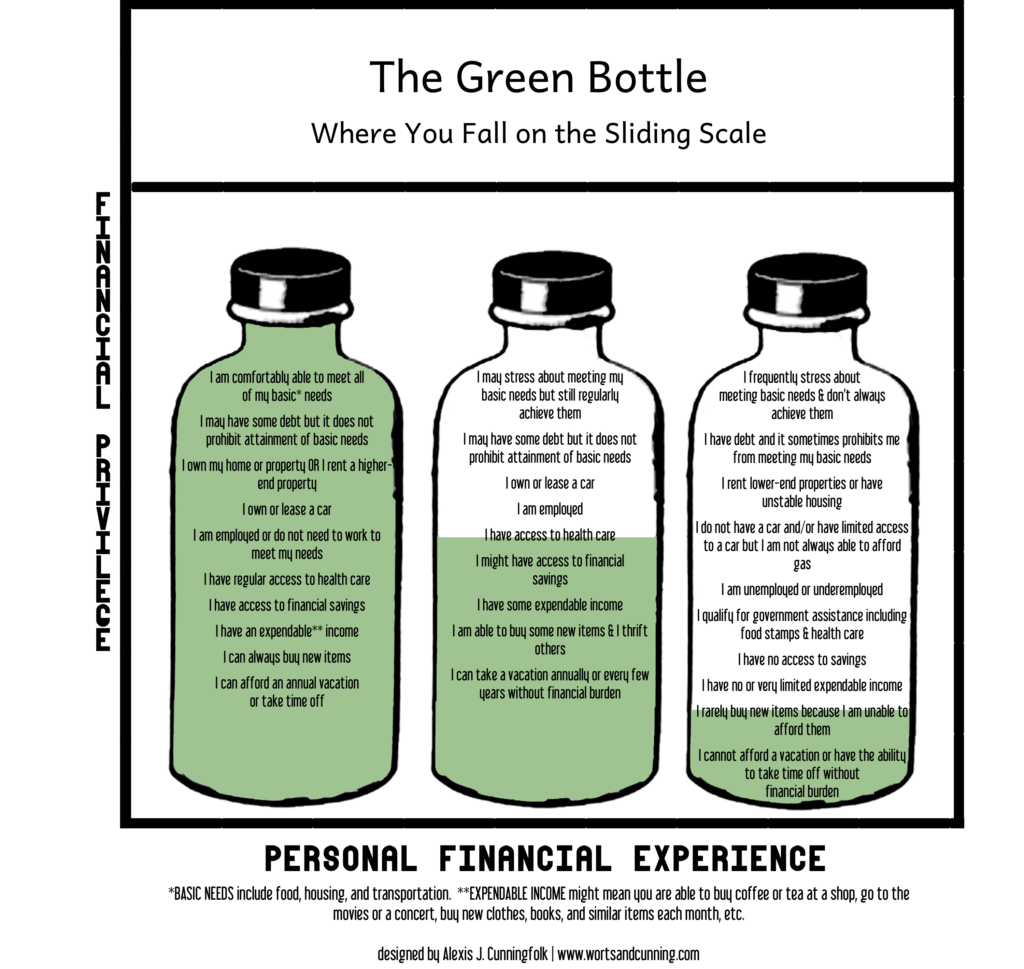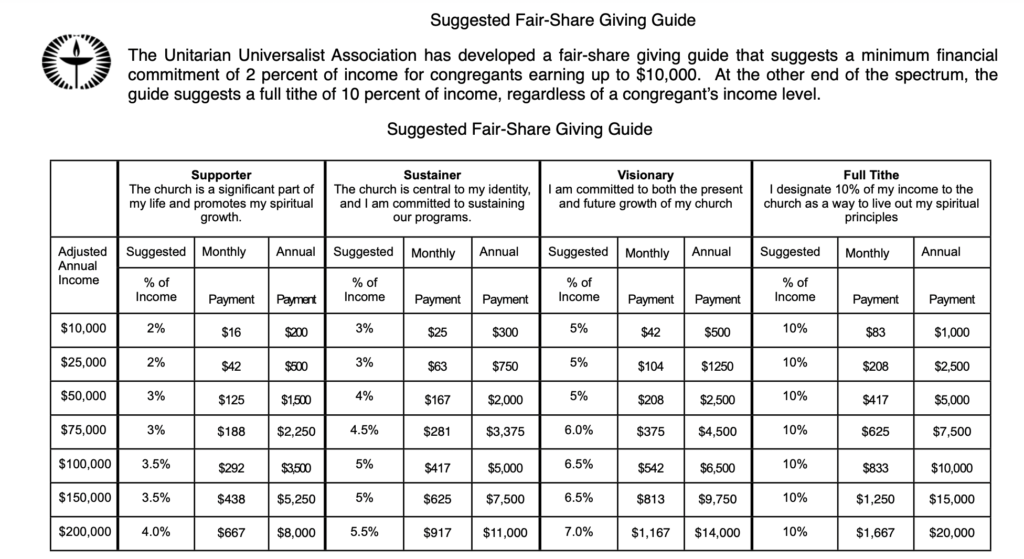Our annual pledge campaign is an an opportunity to empower the church with the necessary financial resources. The pledge campaign does so much: supports the work of ministry; provides for and nurtures staff; ensures our beautiful physical home remains a place of joy and refuge.
The legacy of the pandemic is still with us. Some of the habits of church have faded, one of which is asserting through a financial commitment the heart-centered value we place on this wonderful community. If First Universalist is to continue being a home and harbor for those seeking real community, we need to step forward to underwrite the church’s financial needs.
Our budget for the fiscal year beginning July 1, 2024 is $1.8 million. Annual pledged income is the most significant part of the overall budget at $1.6 million. As a vibrant, 165-year-old community, we have the capacity to fulfill our dreams and aspirations. Now is the opportunity, through a financial commitment for the coming year, to shape the future we desire.
Every pledge is important. Every pledge, no matter the amount, bears witness to our commitment to make real a world of love and hope.
Enclosed in your 2024-2025 pledge packet is information on the church budget and how funds are allocated. There’s salary information and how our staff compensation aligns with UUA guidelines. There’s a note from our Director of Worship on where we’ve been and where worship is going. You’ll find news on Religious Education and how this wonderful program lays the foundation for the UU community of the future. You’ll also find a pledge card that hopefully makes payment choices align with your own financial situation.
We have the opportunity to envision and create the community we seek. Let us offer the financial support as we are able to give the church the resources needed.
We welcome two different methods of setting up an annual gift at church: you can make a pledge (communicate a commitment) now and fulfill it with your preferred payment method in the 2023–2024 fiscal year, or set up a recurring electronic gift.
Make a Pledge
Download a 2024-2025 Pledge Packet here
Fill out a 2024-2025 Pledge Card Online
Set Up Your Recurring Gift
Set up your recurring electronic gift here.
(new gifts only; to make changes to your current recurring/sustaining gift, please contact Jie Wronski-Riley at jie@firstuniv.org)
Frequently Asked Questions:
Question: What’s a pledge? What’s a sustaining gift? How are they different?
Answer: A “pledge” is a commitment of support to the church that is made for a defined period of time, usually one year. A pledge is usually (though not always), paid by cash/check, stock, or electronic transfer of funds initiated by the donor, sometimes through a donor advised fund or similar investment and/or philanthropic vehicle. A sustaining gift is a commitment of support that is made for an open-ended period of time. Sustaining gifts are made via credit card or automatic withdrawal from your bank account. The main difference between the two is how the commitments are paid and their different duration of time. Pledging and making a sustaining gift are both equally important to the church’s financial health. It is also worth noting that “pledge” is often shorthand for “pledge or sustaining gift.”
Question: I give on Sundays in the offering basket, doesn’t that count?
Answer: Your gifts to Sunday’s offering are incredibly important, and they don’t support the church all that much. Most Sundays, unless otherwise noted, the larger portion of the total received in the offering is sent to that Sunday’s offering recipient – usually a community organization with whom the church partners. These gifts do not count toward your commitment unless you put your contribution in an envelope and note that it is to be counted toward your commitment.
Question: How much should I give?
Answer: How much to give is a question of spiritual discernment and your capacity to give. The “Green Bottle Sliding Scale” and UUA Fair Share Guide below together offer a way to think about your financial circumstances and how that can translate to your giving.
The more full your bottle, the more resources you are likely able to contribute. See the UUA Fair Share Giving Guide for concrete numbers on how income translates to suggested giving levels.
Question: These are great, but I need a bit more help!
Answer: Got it! Start with the bottles. Figure out which bottle best describes your life experience.
If your bottle is struggling to fill and your life experience resonates with the far right bottle above, your target for giving in actual numbers recommended by the UUA might be the “supporter” level.
If you mostly identify with the middle bottle above, the UUA equivalent recommendation would be the “sustainer” level.
If you comfortably live in the experience described by the full bottle above, you would aim for the “visionary” or “full tithe” numbers from the UUA.
If your life’s resources are beyond the explanation of the bottles in the direction of wealth, the “full tithe” is the proportional gift recommended.
Question: Does my gift really make that much of a difference?
Answer: Yes. Every gift is deeply meaningful because every gift is the result of someone, including you, making the choice to support the congregation. There is no such thing as a “too small” gift, and there is no such thing as a “too big” gift. We don’t compare gifts and we don’t treat people differently based on what they give. We do ask that folks who’ve made a commitment to the church, formally as a member or just in your heart, make a gift of support that’s significant to them and grounded in their spiritual reflection on what giving to church means to them.
Question: Giving is bringing up all kinds of hard questions I have these days about church. What do I do with that?
Answer: Giving is a spiritual practice that requires coming into right relationship with ourselves, the resources to which we have access and community. If there is a breach of relationship with which you are struggling – with your own spiritual self, with your resources or with this community – we are here to listen and help you find your way to wholeness and connection again.
Question: I don’t understand this fiscal year, next fiscal year, etc. help!
Answer: It is confusing! By “fiscal year” we’re talking about the one year period of time that the church’s budget is built for. The church’s fiscal year runs from July 1 of one year to June 30th of the next year. This year, our fiscal year started on July 1, 2023 and will end on June 30, 2024. There are many reasons why a church (or business, or nonprofit) would want to use a fiscal year different from a calendar year. One reason the church benefits from our fiscal year ending/beginning in the summer is that it saves our staff from needing to manage year-end accounting during December which is already an incredibly busy time for church staff.
Questions?
Contact Bookkeeper Jie Wronski-Riley at jie@firstuniv.org or 612-405-5502.


